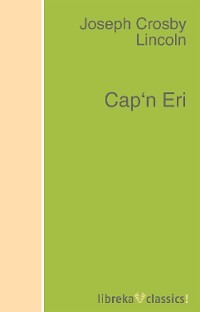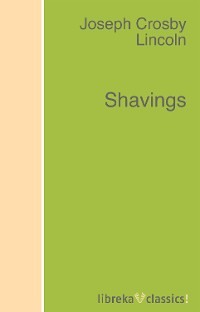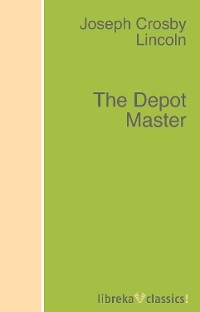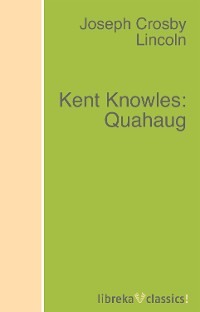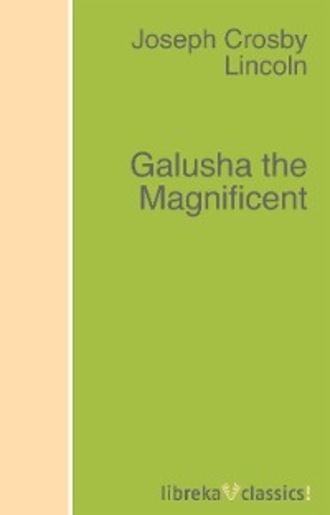
Полная версия
Galusha the Magnificent
"But—but what AILS him? Is he drunk?"
"Drunk? What put such a notion as that in your head? Of course he isn't drunk."
"He ain't—he ain't dead?"
"Don't be so silly. He's fainted away, that's all. He's tired out and half sick and half starved, I guess. Here, where are you goin'?"
"I'm a-goin' to fetch some water. They always heave water on fainted folks."
"Well, this one's had all the water he needs already. The poor thing is soaked through. You go to the pantry and in the blue soup tureen, the one we don't use, you'll find a bottle of that cherry rum Cap'n Hallet gave me three years ago. Bring it right here and bring a tumbler and spoon with it. After that you see if you can get Doctor Powers on the telephone and ask him to come right down here as quick as he can. HURRY! Primmie Cash, if you stop to ask one more question I—I don't know what I'll do to you. Go ALONG!"
Miss Cash went along, noisily along. Her mistress bent over the wet, pitiful little figure upon the sofa.
And thus, working by devious ways, did Fate bring about the meeting of Galusha Cabot Bangs, of the National Institute, Washington, D. C., and Miss Martha Phipps, of East Wellmouth, which, it may be said in passing, was something of an achievement, even for Fate.
CHAPTER II
And in order to make clear the truth of the statement just made, namely, that Fate had achieved something when it brought Galusha Bangs to the door of Martha Phipps' home that rainy night in October—in order to emphasize the truth of that statement it may be well, without waiting further, to explain just who Galusha Cabot Bangs was, and who and what his family was, and how, although the Bangses were all very well in their way, the Cabots—his mother's family—were "the banking Cabots of Boston," and were, therefore, very great people indeed.
"The banking Cabots" must not be confused with any other branch of the Cabots, of which there are many in Boston. All Boston Cabots are "nice people," many are distinguished in some way or other, and all are distinctly worth while. But "the banking Cabots" have been deep in finance from the very beginning, from the earliest of colonial times. The salary of the Reverend Cotton Mather was paid to him by a Cabot, and another Cabot banked whatever portion of it he saved for a rainy day. In the Revolution a certain Galusha Cabot, progenitor of the line of Galusha Cabots, assisted the struggling patriots of Beacon Hill to pay their troops in the Continental army. During the Civil War his grandson, the Honorable Galusha Hancock Cabot, one of Boston's most famous bankers and financiers, was of great assistance to his state and nation in the sale of bonds and the floating of loans. His youngest daughter, Dorothy Hancock Cabot, married—well, she should, of course, have married a financier or a banker or, at the very least, a millionaire stockbroker. But she did not, she married John Capen Bangs, a thoroughly estimable man, a scholar, author of two or three scholarly books which few read and almost nobody bought, and librarian of the Acropolis, a library that Bostonians and the book world know and revere.
The engagement came as a shock to the majority of "banking Cabots." John Bangs was all right, but he was not in the least "financial." He was respected and admired, but he was not the husband for Galusha Hancock Cabot's daughter. She should have married a Kidder or a Higginson or some one high in the world of gold and securities. But she did not, she fell in love with John Bangs and she married him, and they were happy together for a time—a time all too brief.
In the second year of their marriage a baby boy was born. His mother named him, her admiring husband being quite convinced that whatever she did was sure to be exactly the right thing. So, in order to keep up the family tradition and honors—"He has a perfect Cabot head. You see it, don't you, John dear"—she named him Galusha Cabot Bangs. And then, but three years afterward, she died.
John Capen Bangs remained in Boston until his son was nine. Then his health began to fail. Years of pawing and paring over old volumes amid the dust and close air of book-lined rooms brought on a cough, a cough which made physicians who heard it look grave. It was before the days of Adirondack Mountain sanitariums. They told John Bangs to go South, to Florida. He went there, leaving his son at school in Boston, but the warm air and sunshine did not help the cough. Then they sent him to Colorado, where the boy Galusha joined him. For five years he and the boy lived in Colorado. Then John Capen Bangs died.
Dorothy Hancock Cabot had a sister, an older sister, Clarissa Peabody Cabot. Clarissa did not marry a librarian as her sister did, nor did she marry a financier, as was expected of her. This was not her fault exactly; if the right financier had happened along and asked, it is quite probable that he would have been accepted. He did not happen along; in fact, no one happened along until Clarissa was in her thirties and somewhat anxious. Then came Joshua Bute of Chicago, and when wooed she accepted and married him. More than that, she went with him to Chicago, where stood the great establishment which turned out "Bute's Banner Brand Butterine" and "Bute's Banner Brand Leaf Lard" and "Bute's Banner Brand Back-Home Sausage" and "Bute's Banner Brand Better Baked Beans." Also there was a magnificent mansion on the Avenue.
Aunt Clarissa had family and culture and a Boston manner. Uncle Joshua had a kind heart, a hemispherical waistcoat and a tremendous deal of money. Later on the kind heart stopped beating and Aunt Clarissa was left with the money, the mansion and—but of course the "manner" had been all her own all the time.
So when John Bangs died, Aunt Clarissa Bute sent for the son, talked with the latter, and liked him. She wrote to her relative, Augustus Adams Cabot, of Cabot, Bancroft and Cabot, in Boston, who, although still a young man, was already known as a financier, and looked out for her various investments, saying that she found young Galusha "a nice boy, though rather odd, like his father," and that she thought of taking his rearing and education into her own hands. "I have no children of my own, Augustus. What do you think of the idea?" Augustus thought it a good one; at least he wrote that he did. So Aunt Clarissa took charge of Galusha Bangs.
The boy was fourteen then, a dreamy, shy youngster, who wore spectacles and preferred curling up in a corner with a book to playing baseball. It was early spring when he came to live with Aunt Clarissa and before the summer began he had already astonished his relative more than once. On one occasion a visitor, admiring the Bute library, asked how many volumes it contained. Aunt Clarissa replied that she did not know. "I have added from time to time such books as I desired and have discarded others. I really have no idea how many there are." Then Galusha, from the recess by the window, looked up over the top of the huge first volume of Ancient Nineveh and Its Remains which he was reading and observed: "There were five thousand six hundred and seventeen yesterday, Auntie."
Aunt Clarissa started so violently that her eyeglasses fell from her aquiline nose to the end of their chain.
"Good heavens, child! I didn't know you were there. What did you say?"
"I said there were five thousand six hundred and seventeen books on the shelves here yesterday."
"How do you know?"
"I counted them."
"COUNTED them? Mercy! What for?"
Galusha's spectacles gleamed. "For fun," he said.
On another occasion his aunt found him still poring over Ancient Nineveh and Its Remains; it was the fifth volume now, however.
"Do you LIKE to read that?" she asked.
"Yes, Auntie. I've read four already and, counting this one, there are five more to read."
Now Aunt Clarissa had never read Ancient Nineveh herself. Her bookseller had assured her that it was a very remarkable set, quite rare and complete. "We seldom pick one up nowadays, Mrs. Bute. You should buy it." So Aunt Clarissa bought it, but she had never thought of reading it.
She looked down over her nephew's shoulder at the broad page with its diagram of an ancient temple and its drawings of human-headed bulls in bas-relief.
"Why do you find it so interesting?" she asked.
Galusha looked up at her. His eyes were alight with excitement.
"They dig those things up over there," he said, pointing to one of the bulls. "It's all sand and rocks—and everything, but they send an expedition and the people in it figure out where the city or the temple or whatever it is ought to be, and then they dig and—and find it. And you can't tell WHAT you'll find, exactly. And sometimes you don't find much of anything."
"After all the digging and work?"
"Yes, but that's where the fun comes in. Then you figure all over again and keep on trying and trying. And when you DO find 'em there are sculptures like this—oh, yards and yards of 'em—and all sort of queer, funny old inscriptions to be studied out. Gee, it must be great! Don't you think so, Auntie?"
Aunt Clarissa's reply was noncommittal. That evening she wrote a letter to Augustus Cabot in Boston. "He is a good boy," she wrote, referring to Galusha, "but queer—oh, dreadfully queer. It's his father's queerness cropping out, of course, but it shouldn't be permitted to develop. I have set my heart on his becoming a financier like the other Galushas in our line. Of course he will always be a Bangs—more's the pity—but his middle name is Cabot and his first IS Galusha. I think he had best continue his schooling in or near Boston where you can influence him, Augustus. I wish him well grounded in mathematics and—oh, you understand, the financial branches. Select a school, the right sort of school, for him, to oblige me, will you, Gus?"
Augustus Cabot chose a school, a select, aristocratic and expensive school near the "Hub of the Universe." Thither, in the fall, went Galusha and there he remained until he was eighteen, when he entered Harvard. At college, as at school, he plugged away at his studies, and he managed to win sufficiently high marks in mathematics. But his mathematical genius was of a queer twist. In the practical dollars and cents sort of figuring he was almost worthless. Money did not interest him at all. What interested him was to estimate how many bricks there were in "Mem" and how many more there might have been if it had been built a story higher.
"This room," he said to a classmate, referring to his study in old Thayer, "was built in ——" naming the year. "Now allowing that a different fellow lived in it each year, which is fair enough because they almost always change, that means that at least so many fellows," giving the number, "have occupied this room since the beginning. That is, provided there was but one fellow living in the room at a time. Now we know that, for part of the time, this was a double room, so—"
"Oh, for the love of Mike, Loosh!" exclaimed the classmate, "cut it out. What do you waste your time doing crazy stunts like that for?"
"But it's fun. Say, if they had all cut their initials around on the door frames and the—ah—mop boards it would be great stuff to puzzle 'em out and make a list of 'em, wouldn't it? I wish they had."
"Well, I don't. It would make the old rat hole look like blazes and it is bad enough as it is. Come on down and watch the practice."
One of young Bangs' peculiar enjoyments, developed during his senior year, was to visit every old cemetery in or about the city and examine and copy the ancient epitaphs and inscriptions. Pleasant spring afternoons, when normal-minded Harvard men were busy with baseball or track or tennis, or the hundred and one activities which help to keep young America employed in a great university, Galusha might have been, and was, seen hopping about some grass-grown graveyard, like a bespectacled ghoul, making tracings of winged death's-heads or lugubrious tombstone poetry. When they guyed him he merely grinned, blushed, and was silent. To the few—the very few—in whom he confided he made explanations which were as curious as their cause.
"It's great fun," he declared. "It keeps you guessing, that's it. Now, for instance, here's one of those skull jiggers with wings on it. See? I traced this over at Copp's Hill last spring, a year ago. But there are dozens of 'em all about, in all the old graveyards. Nobody ever saw a skull with wings; it's a—a—ah—convention, of course. But who made the first one? And why did it become a convention? And—and—why do some of 'em have wings like this, and some of 'em crossbones like a pirate's flag, and some of 'em no wings or bones, and why—"
"Oh, good Lord! I don't know. Forget it. You make a noise like a hearse, Loosh."
"Of course you don't know. I don't know. I don't suppose anybody knows, exactly. But isn't it great fun to study 'em up, and see the different kinds, and think about the old chaps who carved 'em, and wonder about 'em and—"
"No, I'll be banged if it is! It's crazy nonsense. You've got pigeons in your loft, Loosh. Come on out and give the birds an airing."
This was the general opinion of the class of 19—, that old "Loosh had pigeons in his loft." However, it was agreed that they were harmless fowl and that Galusha himself was a good old scout, in spite of his aviary.
He graduated with high honors in the mathematical branches and in languages. Then the no less firm because feminine hand of Aunt Clarissa grasped him, so to speak, by the collar and guided him to the portals of the banking house of Cabot, Bancroft and Cabot, where "Cousin Gussie" took him in charge with the instructions to make a financier of him.
"Cousin Gussie," junior member of the firm, then in his early thirties, thrust his hands into the pockets of his smart tweed trousers, tilted from heels to toes of his stylish and very shiny shoes and whistled beneath his trim mustache. He had met Galusha often before, but that fact did not make him more optimistic, rather the contrary.
"So you want to be a banker, do you, Loosh?" he asked.
Galusha regarded him sadly through the spectacles.
"Auntie wants me to be one," he said.
The experiment lasted a trifle over six months. At the end of that time the junior partner of Cabot, Bancroft and Cabot had another interview with his firm's most recent addition to its list of employees.
"You're simply no good at the job, that's the plain truth," said the banker, with the candor of exasperation. "You've cost us a thousand dollars more than your salary already by mistakes and forgetfulness and all the rest of it. You'll never make your salt at this game in a million years. Don't you know it, yourself?"
Galusha nodded.
"Yes," he said, simply.
"Eh? Oh, you do! Well, that's something."
"I knew it when I came here."
"Knew you would be no good at the job?"
"At this job, yes."
"Then for heaven's sake why did you take it?"
"I told you. Aunt Clarissa wanted me to."
"Well, you can't stay here, that's all. I'm sorry."
"So am I, for Auntie's sake and yours. I realize I have made you a lot of—ah—trouble."
"Oh, that's all right, that's all right. Hang it all, I feel like a beast to chuck you out this way, but I have partners, you know. What will you do now?"
"I don't know."
Cousin Gussie reflected. "I think perhaps you'd better go back to Aunt Clarissa," he said. "Possibly she will tell you what to do. Don't you think she will?"
"Yes."
"Humph! You seem to be mighty sure of it. How do you know she will?"
For the first time a gleam, a very slight and almost pathetic gleam, of humor shone behind Galusha's spectacles.
"Because she always does," he said. And thus ended his connection with the banking profession.
Aunt Clarissa was disgusted and disappointed, of course. She expressed her feelings without reservation. However, she laid most of the blame upon heredity.
"You got it from that impractical librarian," she declared. "Why did Dorothy marry him? She might have known what the result would be."
Galusha was more downcast even than his relative.
"I'm awfully sorry, Aunt Clarissa," he said. "I realize I am a dreadful disappointment to you. I tried, I honestly did, but—"
And here he coughed, coughed lengthily and in a manner which caused his aunt to look alarmed and anxious. She had heard John Capen Bangs cough like that. That very afternoon the Bute family physician saw, questioned and examined Galusha. The following day an eminent specialist did the same things. And both doctors looked gravely at each other and at their patient.
Within a week Galusha was on his way to an Arizona ranch, a place where he was to find sunshine and dry climate. He was to be out of doors as much as possible, he was to ride and walk much, he was to do all sorts of distasteful things, but he promised faithfully to do them, for his aunt's sake. As a matter of fact, he took little interest in the matter for his own. His was a sensitive spirit, although a quiet, shy and "queer" one, and to find that he was "no good" at any particular employment, even though he had felt fairly certain of that fact beforehand, hurt more than he acknowledged to others. Galusha went to Arizona because his aunt, to whose kindness and generosity he owed so much, wished him to do so. For himself he did not care where he went or what became of him.
But his feelings changed a few months later, when health began to return and the cough to diminish in frequency and violence. And then came to the ranch where he lodged and boarded an expedition from an eastern museum. It was an expedition sent to explore the near-by canyon for trace of the ancient "cliff dwellers," to find and, if need be, excavate the villages of this strange people and to do research work among them. The expedition was in charge of an eminent scientist. Galusha met and talked with the scientist and liked him at once, a liking which was to grow into adoration as the acquaintanceship between the two warmed into friendship. The young man was invited to accompany the expedition upon one of its exploring trips. He accepted and, although he did not then realize it, upon that trip he discovered, not only an ancient cliff village, but the life work of Galusha Cabot Bangs.
For Galusha was wild with enthusiasm. Scrambling amid the rocks, wading or tumbling into the frigid waters of mountain streams, sleeping anywhere or not sleeping, all these hardships were of no consequence whatever compared with the thrill which came with the first glimpse of, high up under the bulging brow of an overhanging cliff, a rude wall and a cluster of half ruined dwellings sticking to the side of the precipice as barn swallows' nests are plastered beneath eaves. Then the climb and the glorious burrowing into the homes of these long dead folk, the hallelujahs when a bit of broken pottery was found, and the delightfully arduous labor of painstakingly uncovering and cleaning a bit of rude carving. The average man would have tired of it in two days, a week of it would have bored him to distraction. But the longer it lasted and the harder the labor, the brighter Galusha's eyes sparkled behind his spectacles. Years before, when his aunt had asked him concerning his interest in the books about ancient Nineveh, he had described to her the work of the explorers and had cried: "Gee, it must be great!" Well, now he was, in a very humble way, helping to do something of the sort himself, and—gee, it WAS great!
Such enthusiasm as his and such marked aptitude, amounting almost to genius, could not help but make an impression. The distinguished savant at the head of the expedition returned the young man's liking. Before returning East, he said:
"Bangs, next fall I am planning an expedition to Ecuador. I'd like to have you go with me. Oh, this isn't offered merely for your sake, it is quite as much for mine. You're worth at least three of the average young fellows who have trained for this sort of thing. There will be a salary for you, of course, but it won't be large. On the other hand, there will be no personal expense and some experience. Will you go?"
Would he GO? Why—
"Yes, I know. But there is your health to be considered. I can't afford to have a sick man along. You stay here for the present and put in your time getting absolutely fit."
"But—but I AM fit."
"Um—yes; well, then, get fitter."
Galusha went to Ecuador. Aunt Clarissa protested, scolded, declared him insane—and capitulated only when she found that he was going anyhow. He returned from the expedition higher than ever in favor with his chief. He was offered a position in the archeological department of the museum. He accepted first and then told Aunt Clarissa.
That was the real beginning. After that the years rolled placidly along. He went to Egypt, under his beloved chief, and there found exactly what he had dreamed. The desert, the pyramids, the sculptures, the ancient writings, the buried tombs and temples—all those Galusha saw and took, figuratively speaking, for his own. On his return he settled down to the study of Egyptology, its writings, its history, its every detail. He made another trip to the beloved land and distinguished himself and his museum by his discoveries. His chief died and Galusha was offered the post left vacant. He accepted. Later—some years later—he was called to the National Institute at Washington.
When he was thirty-seven his Aunt Clarissa died. She left all her property to her nephew. But she left it in trust, in trust with Cousin Gussie. There was a letter to the latter in the envelope with the will. "He is to have only the income, the income, understand—until he is forty-five," Aunt Clarissa had written. "Heaven knows, I am afraid even THAT is too young for a child such as he is in everything except pyramids."
Cousin Gussie, now the dignified and highly respected senior partner of Cabot, Bancroft and Cabot, took charge of the Bute—now the Bangs—property. There was not as much of it as most people had supposed; since Uncle Joshua passed on certain investments had gone wrong, but there was income enough to furnish any mortal of ordinary tastes with the means of gratifying them and still have a substantial residue left. Galusha understood this, in a vague sort of way, but he did not care. Outside of his beloved profession he had no tastes and no desires. Life for him was, as Cousin Gussie unfeelingly put it, "one damned mummy after the other." In fact, after the arrival of the first installment of income, he traveled posthaste to the office of his Boston relative and entered a protest.
"You—you mustn't send any more, really you mustn't," he declared, anxiously. "I don't know what to do with it."
"DO with it? Do with the money, you mean?"
"Yes—yes, that's it."
"But don't you need it to live on?"
"Oh, dear me, no!"
"What DO you live on?"
"Why, my salary."
"How much is your salary, if you don't mind telling us?"
Galusha did not in the least mind. The figure he named seemed a small one to his banking relative, used to big sums.
"Humph!" grunted the latter; "well, that isn't so tremendous. They don't overpay you mummy-dusters, do they? And you really don't want me to send you any more?"
"No, not if you're sure you don't mind."
"Oh, I don't mind. Then you want me to keep it and reinvest it for you; is that it?"
"I—I think so. Yes, reinvest it or—ah—something."
"But you may need some of it occasionally. If you do you will notify me, of course."
"Oh, yes; yes, indeed. Thank you very much. It's quite a weight off my mind, really it is."
Cabot could not help laughing. Then a thought struck him.
"Did you bring back the check I sent you?" he asked. Galusha looked somewhat confused.


